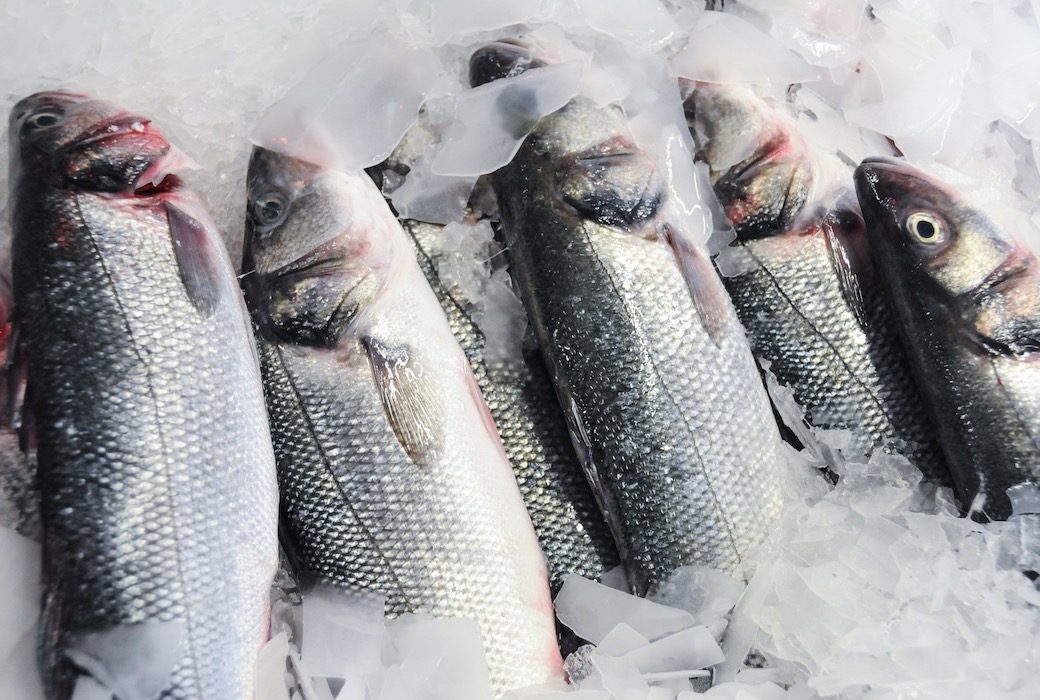Words by Jessica Andrews
Photography by Ella Louise Sullivan
Fiction
The Fishmonger
The briny sting of grief

Words by Jessica Andrews
Photography by Ella Louise Sullivan
A short story by Jessica Andrews exploring mother-daughter relationships, intimacy and distance, desire and revulsion, the female body and shifting selves.
Haddock: grilled at a dinner party. A long table in a garden beneath a chestnut tree. Boiled potatoes; buttery and soft. Citronella candles sputter into dusk. Midge bites are sharp and sour. Stale sun on my skin and feet slipped out of sandals, cold in the grass. A hand brushes mine accidentally and I am caught for a moment. Lemon juice coats my teeth and the night rushes onward. Someone lights a cigarette and the party becomes a pinpoint, a small chink of light, shimmering in salt.
My grandmother was a fishmonger. She wore a polyester tabard to work and it snagged the chapped skin on her hands, marbled with veins from a lifetime of chemicals. She chopped cod and laid it in chunks beneath polished glass where it glimmered like rose quartz. She was an expert at removing spines. She dangled delicate skeletons from her fingers and silently scanned the bones to make sure there were no strays left to catch in the soft pink throats of the old ladies whose breath misted the counter on silvery mornings. She scraped her knife along the glittering bodies of rainbow trout and wiped their scales from the counter where they gathered on the floor as briny confetti, to be swept up at the end of the day and left on the back step for the rubbish trucks, glinting through the dirt.
She took home brown kippers in plastic bags and my mother learned how to twist the heads from shrimps without squirming and slurp out their gooey insides. Together they tucked families of sardines into white breaded duvets and wrapped them in newspaper, slipping them into my grandfather’s overall pocket for him to find on his break.
My grandmother died when I was small, and my mother banned fish from our dinner table. The lingering sea stirred a longing inside of her for the kinds of things that bind mothers to their children; dark, fleshy caverns, pulsing and sore.
She scraped her knife along the glittering bodies of rainbow trout and wiped their scales from the counter where they gathered on the floor as briny confetti
Anchovies: curled inside olives at a picnic on the beach. Sand rubbing against my edges, nipples puckered beneath the sun. A hand on my back, tracing unknowable shapes. Sticking my tongue into the olive pit, sucking out the brine inside. The sea rushing towards us, fast and rough. A stirring inside of me, red-raw and irrevocable.
When my grandmother died, my mother drew further and further into herself. She stopped wearing her red Revlon lipstick and took down the wind chimes she had strung together with shells and crab claws and hung above our doors.
"The smell hurts me, Janey, baby." She turned on the television and let the colours wash over her. I mooned around her bedroom door, aching to bury my face in her silky dressing gown, craving the talcum powder tang of her.
"Go and play, love." She sniffed, pulling the cord tightly around her waist. "Give me a bit of peace." I didn’t understand what was happening, that she was shifting from a multitude into something singular. Instead of being both a mother and a daughter, she was now only a mother. She had to grow a strong red that was all her own, where before it had been outside, wrapped around her. I couldn’t understand, not then, being only a daughter myself.

Salmon: smoked and raw, delicate, peach-coloured. Curled on top of bagels, cream cheese oozing from the holes. A hand beneath my bathrobe, warm and reassuring. A hangover; the world pulsing gently beneath my eyelids, the saturation too high. Warm breath in my ear and the feeling of something closing in, white hot and dangerous. We reach out and take it, without considering the consequences.
Now I am grown-up and I can eat whatever I like. I live in a hard, fast city far away from my mother. I have grown to love seafood, in the way that adults often develop a taste for that which was forbidden in childhood. I love the salt and the brine and the cavernous fishy smell, so deep you could climb inside of it. I like the way that it is on the verge of disgusting. I like to think that things that are on the edge of horrible are often the most delicious.
My mother is coming to visit. I have a secret inside of me, one that is going to change us. The soft dark that binds us is twisting into something new. My mother does not eat seafood but I am bringing her to a seafood restaurant, because I want to remind her what it feels like to have the sea inside of you, to be bound to a mother, to be aware of the blood and the fleshy perfume of all the women who came before you flickering just outside of your vision. I want my mother to remember how it feels to need a history to hold on to, to be part of something that is definitively in the past and cannot be changed. I want to anchor myself to other women in order to be sure that I exist, and to assuage the saliva-saturated fear of my own body. My mother and I are balancing on the verge between a past and a present. I want us to savour this in-between space.
I have grown to love seafood, in the way that adults often develop a taste for that which was forbidden in childhood
Mussels: stewed in garlic and fed to me in bed on chunks of crusty bread, sucking the sauce from fingers and gorging ourselves on thick, viscous love. Hands stray to my belly and I feel a purple heat inside of me, aching and bruising as inevitability unspools.
She looks at me with fear as I lead her towards the entrance. I can see the memory of her own mother’s sore hands flickering in her eyes, stroking her hair, catching on her school pinafore. I recognise the simultaneous disgust and desire struggling beneath my mother’s skin. She slips her arm through mine and in this moment she is vulnerable.
"Janey," she begins, but I hold her tight.
My mother and I rarely eat in restaurants together. I think having is something we are both afraid of, in different ways. I am learning how to nourish myself, and I want her to feel that too; that she is deserving of being nourished, she who nourished me.

Tuna: in a simple sandwich. Mayonnaise and sweetcorn, mashed up in fear. I want this and I do not want it. My flesh is melting and forming a new shape, one with his face and my face and an unknown face, a mystery, formless and pink. I want to understand my mother better. I want to learn the heavy velvet of her love; stifling and abundant.
We stop outside the restaurant and look at the menu. "I won’t know what to order," she protests, but I point out there are lots of things that are unfamiliar to me, too. I want her to feel that it is okay not to know the names of things, because that is something that took me a long time to learn, although now I think about it, maybe she is the one who taught me.
The air is porridge and we wade through it. It is false bright and electric inside. The secret writhes inside of me, but here among the wine bottles stacked in towers, the waiters moving calmly from table to table, the polishing of spoons and the folding of napkins, we are safe.
Calamari: battered and golden, from a warm paper bag, walking through hot city streets. We take a walk along the river to clear our heads and to try and mould the future into a shape that we can wrap our hands around. The river moves too fast and the ripples are always changing. I think of all the women who have led me to this edge. I imagine their hair plaited along the riverbank, forming a solid rope for me to hold on to.
We sit down, and my mother settles into an expression that is unfamiliar to me. She scans the menu silently, and orders shellfish linguine. I am surprised, and realise that she has a life that I do not know about. This knowledge makes me feel far away from her, the red parts of ourselves stretched across train tracks and snaking along the roofs of terraced houses.
We are sitting by the window and there are blue lights flashing on the street outside. The restaurant takes on an underwater feel; the two of us, suspended in time and place. For a moment the world is not-moving and we are not-changing. I bite into a scallop and the sea fills my mouth and our bodies are doing the same thing at the same moment in time, even as my selves are shifting and changing in irrevocable ways. We share small, brackish morsels that we don’t know the names of. My mother shells prawns with a flourish. My lipstick comes off and I am greasy all over but I want to save this image before the secret spills and the moment changes and I become a different thing altogether. My mother smiles as the redness flickers around us and the blue lights illuminate a danger somewhere else. I am afraid of the outside and the unknowable future, but for now we are here, oily and salt-soaked, until the present is fractured and we have to grow into someone new.






